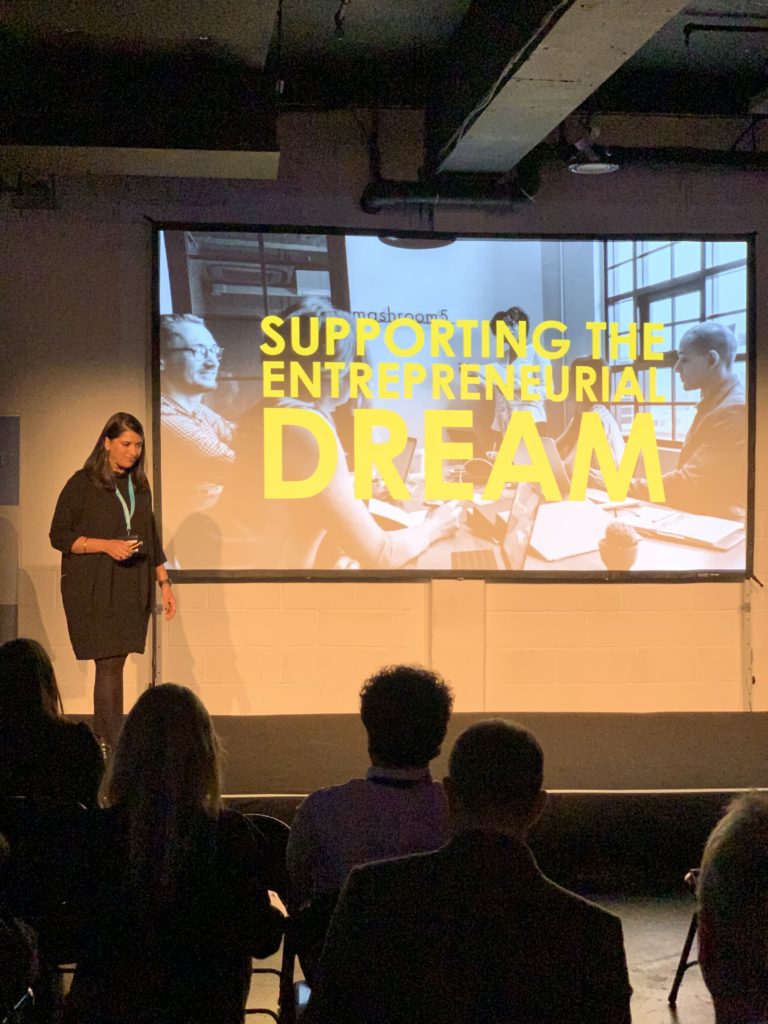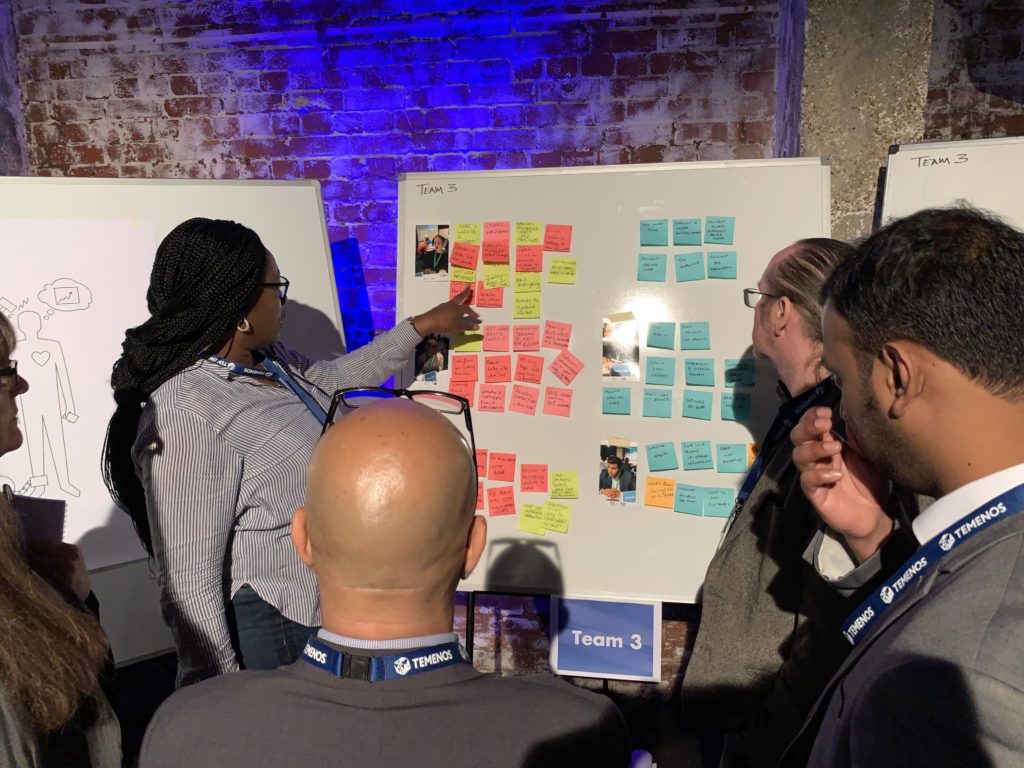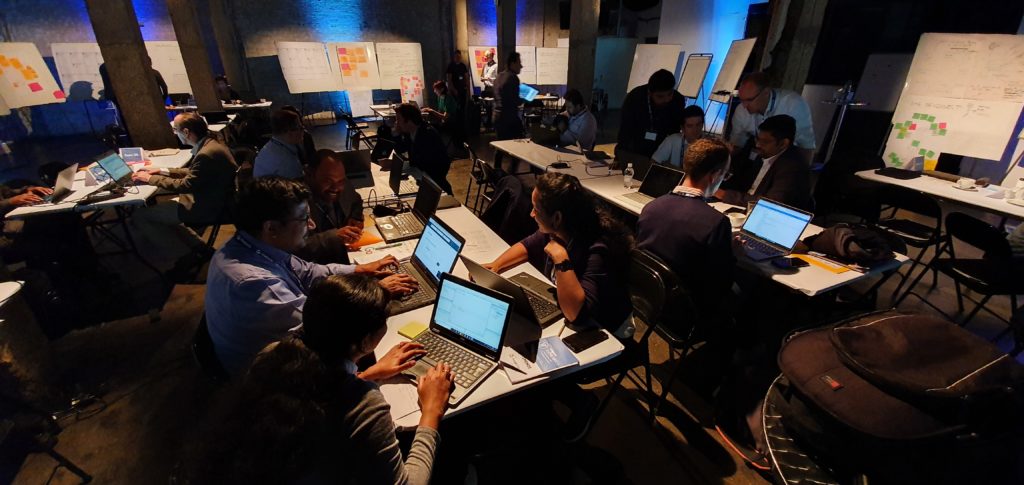Innovation in Action
Addressing real world challenges for SME banking customers.
One of the things I enjoy about my role is meeting and working with clients, partners and our own Temenos people to figure out how we can come up with solutions to challenges faced by banking customers and the banks themselves. Lately, I’ve been on the road, working on smaller developer sessions with clients in London, Sydney and Mexico and Cairo and I have been impressed by how much can be accomplished when working in a collaborative way. I know from experience there is never just one answer to a problem and the process of iterating ideas never ceases to amaze me in the variety and depth of approaches. As we come to the end of the year I thought now was the perfect time to reflect on one of those sessions which took place in London in October this year.
In partnership with Google Cloud and sponsored by Aspire, Temenos held an SME banking workshop in London, our Temenos Think Space event. The two day event started with a number of keynote speakers, followed by multiple interviews with representatives from banks, developers and the SME community. On the final day of the two day event, teams presented a number of new concepts for innovative banking services to address the needs of small to medium sized businesses.
I was fortunate enough to participate in the Think Space as both a facilitator for the session and as a judge on the panel evaluating the final designs presented.
As a Design Thinking practitioner and trainer, this concept of creating a unique setting for all participants to come together as a community with common goals is close to my heart. These types of events bring together both the business and technical parties in order to break them out of their day-to-day activities and truly focus on meaningful innovation.
The Temenos Think Space event moved participants from simply considering potential solutions for business challenges into swiftly developing a fully validated idea that included business and technical validation.
Why SMEs?
The Small and Medium business market (SMEs) represents a very sizable yet underserved market. Globally SMEs employ huge numbers of people, generate a significant proportion of GDP and can contribute significantly to economic growth. The scale is huge – in Europe, across 28 nations, 98% of businesses are SME, employing 93 million people. In the UK alone, SMEs have a turnover of approximately £2 trillion, covering 51% of all private sector turnover in the UK.
SMEs represent a growth segment with unmet needs forecast to contribute £241 billion to the UK economy alone by 2025, a 19% rise from 2018.
“The Future of SME Banking”, Dec. 2018, EY
The evolving needs of the SME Small business owners are very specific, many of which haven’t to date been addressed by traditional banking propositions. As a small business grows their needs become increasingly complex, creating an opportunity for banks to provide tailored products based on their specific growth stage or industry segment.
So where is the disconnect? Why is banking for SMEs such an underserved market when they clearly represent such a large opportunity for financial institutions? What are SMEs looking to achieve, and how can their banks help them get there? This was the overriding purpose of Temenos Think Space – bringing the business and developers together to dive deeper into the customer problem then identifying a solution that could address this need. The majority of time was spent on identifying and refining the customer problem to ensure the solutions were that much clearer to the developers building them on Day 2.
What Did We Learn from SME Business Users?
From the interviews with SME business banking users we made a number of observations around some of the challenges they face. We found that:
- SME’s perceive that banks do not truly understand their business and are ill equipped to meet the urgent needs of a small business struggling to grow.
- They do not trust banking institutions in general to have their best interests at heart. It is for these reasons SMEs don’t even consider looking to their bank for anything more that the provision of basic banking needs.
- If banks were able to transform from today’s existing transactional ‘business only’ relationships into becoming trusted partners, they would be able to service SMEs in a more engaging way leveraging the banks knowledge, contacts and networks to support the smaller business with growth planning, business optimization and an SME business community.
The Event
“How might we address the real world challenges of a growth focused SME beyond their basic banking needs and become their most relevant trusted business partner and enabler?”

To kick off the event with some insight and inspiration , several speakers shared their vision on innovation and technology. Kam Chana, from Temenos, Richard Radley from Google Cloud, and John Williams from the Agile Business Consortium, shared key insights on the SME market and SME culture as wells as how to use technology in the right way to fuel innovation for the benefit of all parties.
A series of interviews and fact finding sessions followed the presentations, between bankers and representatives from the SME community. This was a unique opportunity for an unfettered, unfiltered, sharing from SMEs of their experiences with business banking, the challenges they face, and what support they need in the management and growth of their own core business.
From one-man bands providing local consulting services, a small IT firm looking to branch out internationally, to a nationwide logistics company turning over tens of millions a year. They identified a range of issues including:
- The overly manual and therefore time consuming categorization of transactions
- The lack of ability to align accounting software with banking data.
- Seemingly “exorbitant” charges for a non-domestic payment and a general lack of understanding of what their business was about.
Common amongst all interviewed SMEs was that they loved working on their core business, but had not so much love for the administration side of running their own business, in particular, banking. They all expressed a desire for their bank to be more open about how they can help their businesses grow and develop– beyond fees and loans – and share with them what other services and contacts they can assist with to help drive mutual growth.
There was a buoyant positivity about the sharing experience that they were part of at Temenos Think Space. The consensus from the SMEs was that they felt genuinely “listened to” by the banks participating. Equally, the representatives from the banking industry were appreciative of the candor of the SMEs and the opportunity to learn about the real challenges SMEs are facing.
The Ideation
The interviewing teams clarified and defined the shared banking problems that could be addressed and started designing a solution to the customer problem. Over the course of the 2 days, 7 solutions were developed, designed and finally presented.

By including the developers and technical experts in the discussions with the SMEs as well as the business banking experts, Temenos Think Space advanced the level of ideas that were circulating and managed to quickly hone in on a true validated idea model. This unique combination of technical and business expertise combined within an environment of trust (and away from the usual day to day work distractions) created some highly original ideas.
Some key themes emerged, as expected, around “saving time” and reducing the confusing world of business banking and many of design teams generated creative ideas for tackling these needs.

With the support of developers from our
sponsors Google Cloud and Aspire Systems and our own Temenos developers, attendees went beyond just sketching out these ideas into building and testing on the second day. From dashboards to voice assistants, there was a lot of ingenuity and technical skill on display.
The Winners
There can of course only be one winner. The team that took the top honors developed a novel digital SME assistant that could integrate with a variety of devices and act unobtrusively to support a SME at any time, in any situation.
Achieving this level of innovative thinking and design underlines the power of collaboration within the design-thinking model. By creating a safe, unhindered space in which to learn and try new ideas with no fear of failure – or distraction – provides the foundation for creative innovation that we all want to see.
This unique event made every attendee an SME customer champion and highlighted the benefits of a design led thinking approach, both for creativity and ensuring the relevancy of the solution to the customer problem.
I also believe that it re-enforced for many of the participants that collaboration isn’t really just a corporate buzzword, it’s an intention to set out to win together.